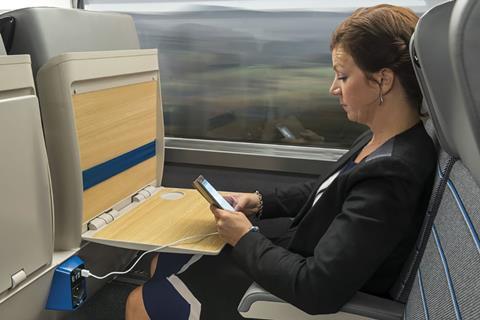Business travel leaders say European train operators are missing an opportunity

EUROPE: Senior figures from the business travel sector have expressed frustration at the difficulty of incorporating rail options into corporate travel systems, saying the sector is failing to respond to demand as companies look for alternatives to air.
At a recent business travel industry event in London, senior figures speaking on condition of anonymity told Railway Gazette International that the European rail sector’s fragmentation and incompatible — or even inaccessible — systems make it very difficult for travel management companies to offer their clients rail as an alternative to air. This is despite growing interest in rail travel as large companies take environmental issues more seriously and are increasingly willing spend time and money lowering their impact.
Third-party ticket retailing platforms are making inroads into opening the rail sector up to the business travel market, but it is proving a slow and difficult process with some train operators unwilling to work with outside companies.
A travel management company insider told Railway Gazette International that there is a particular problem with the complexity of rail fares and ticketing, and lack of access to full data on what is available and on what terms. He said big corporate travel clients accept this as the current reality and are willing to make allowances in support of wider aims to reduce flying. On the other hand, SMEs want to be able to trust that their travel management company always offer the best available fares. This is not always possible at present, leading to reputational damage for the rail sector which is viewed as too complicated.
Reforms to the UK’s byzantine ticketing structure which would require government intervention have been discussed for many years, but so far have only led to tinkering around the edges. One person familiar with ongoing behind-the-scenes negotiations said the rail sector is encouraging major travel clients to lobby for ticketing reform. This is because the UK government has shown little interest in the views of rail and travel companies, but it has been willing to listen when financial services companies push the message that they would really like to make more use of rail but find it too difficult.
‘Confidence and consistency’

A senior figure at a travel management company said corporate clients want ‘confidence and consistency’, which rail does not always offer; business travellers want to be sure that their booked train will actually run, and know what facilities will be available.
He said SNCF has won a significant share of the French domestic inter-city business travel market by meeting these needs. A boost was provided by the French government’s internationally-reported decision to restrict domestic flights where there is a rail alternative taking less than 2½ h; while in practice this only affects a handful of routes, it was seen as a clear signal of government support for rail as a business travel mode.
This success has not been replicated in more fragmented markets or on international routes, with incompatible booking systems and inconsistent information.
‘We are not asking for rail to be cheaper than the alternatives’, a travel team leader at a major financial services company told Railway Gazette International. ’We are just asking for it to be easier.’
Related
Brits forced to pay fee to visit these 30 countries…
UK tourists will be required to pay a fee to visit 30 countries in Europe under new European Union (EU) travel rules.The rules mean British holidaymakers will n
The beautiful European island with just 148 locals
Irakleia is a beautiful island in the Minor Cyclades of Greece, nestled in the heart of the Aegean Sea and just an hour away from Naxos. Officially recorded t
Warning issued for Brits flying easyJet and Ryanair to popular…
Passengers flying with Ryanair, easyJet and British Airways should expect disruption (Picture: Urbanandsport/NurPhoto via Getty Images) Passenge










